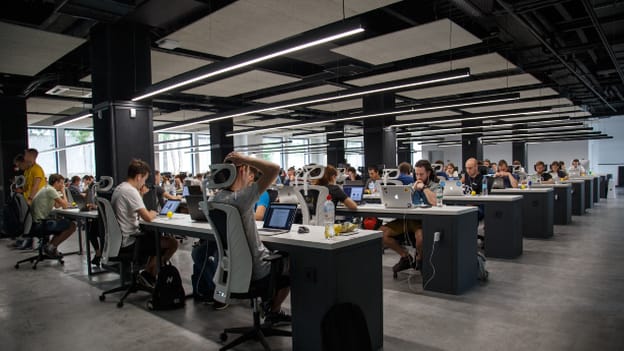What workers really want from their employers

Understanding what existing employees want from their next job is critical to improving a company's talent acquisition and retention tactics. According to a survey, money and well-being related issues have increased dramatically in recent years, securing first and second place as the most important factors for accepting a job elsewhere.
Gallup recently polled 13,085 U.S. employees to find out what factors they considered most significant when considering whether or not to accept a new job offer from a new employer.
Employers who are serious about winning the fight for talent in the next year or two should consider the following six variables as the baseline expectations of potential hires, and should strive to meet these conditions when attempting to attract — or retain — top talent.
A significant increase in income or benefits
According to the poll, the most crucial factor respondents seek in a new job is a substantial boost in pay or perks, which 64 per cent stated is extremely important. This is up from 41% in 2015, when "income or benefits" was the fourth most important factor.
Employees are aware that they are currently in a job seeker's market, which is one of the main reasons for this transition. Wages are increasing as a result of the fierce competition for talent. Job searchers are confident in their ability to earn more money because they realise there are opportunities to earn more.
Better work-life balance and well-being
Work-life balance and wellbeing have risen in importance significantly since 2015, with 53 per cent of employees citing them as "extremely important" versus 61 per cent of today's workforce. Many other Gallup workplace assessments from the past year show how burned out, overwhelmed, and stressed out the general workforce is.
Even for workers who aren't battling with burnout, the rise in remote work has heightened awareness of the importance of workplace flexibility alternatives, which are mostly here to stay.
The ability to do what they do best
People love their work, find it fascinating, and want to do more of it when they have the opportunity to accomplish work that they are naturally skilled at and taught to do. This is, unsurprisingly, one of the most vital items for workers. Workers who aren't allowed to use their strengths frequently seek positions that allow them to do so; workers who do get to use their abilities frequently seek employment that allows them to do so even more.
With this in mind, recruiters should go above and beyond to learn what motivates candidates to do their jobs. Recruiters should also give them a realistic job preview, including how the daily routine will feel, who they will be working with, and what they will be expected to accomplish.
Greater stability and job security
Since Gallup asked in 2015, the importance of this issue has remained unchanged. About half of workers want jobs that offer more stability and security than the ones they have now. Nonetheless, what security means (and what feels secure) has most likely altered since the beginning of the pandemic, and it depends a lot on how you currently feel about the future of your current organisation, industry, and profession in light of what has happened.
Vaccination policies that align with job seekers' beliefs
When it comes to vaccine mandates, there is a scope of disagreement. According to Gallup's statistics on employee vaccines, employees have strong opinions on both sides of the debate. The findings also reveal that alignment between ideas and policies is a major factor in the recruitment of four out of ten employees.
The poll was conducted before the Supreme Court ruled down President Biden's government immunisation mandate, notes Gallup.
Diversity and inclusiveness
The fact that support for developing more equal and inclusive workplaces continues to rise two years after the killing of George Floyd and the international Black Lives Matter protests that followed is a measure of societal development. And, as many businesses have realised, today's workforce needs tangible, significant change on these concerns, rather just platitudes. Recruiters should be ready to talk about such adjustments and obligations.
They must be ready to respond to difficult questions such as - Has the corporation made diversity, equity, and inclusion an "always priority"? Is that dedication reflected in our candidate experience and employer brand?
Bottom line: tailor your approach
Employers must eventually persuade potential employees to buy into their employee value proposition (EVP). People are concerned about pay, as our studies indicate, but they aren't solely concerned about pay vs. everything else. Compensation is inextricably linked to advancement, growth, reward, and recognition, says Ben Wigert, Director of Research and Strategy, Workplace Management, at Gallup.
The art of talent recruitment necessitates the creation of a holistic offer to potential workers, argues Wigert.
Employers should think about improving their compensation dialogues, reviewing their wellness promise, evaluating their EVP and candidate experience, and narrowing their emphasis to top talent, Wigert concludes.
















